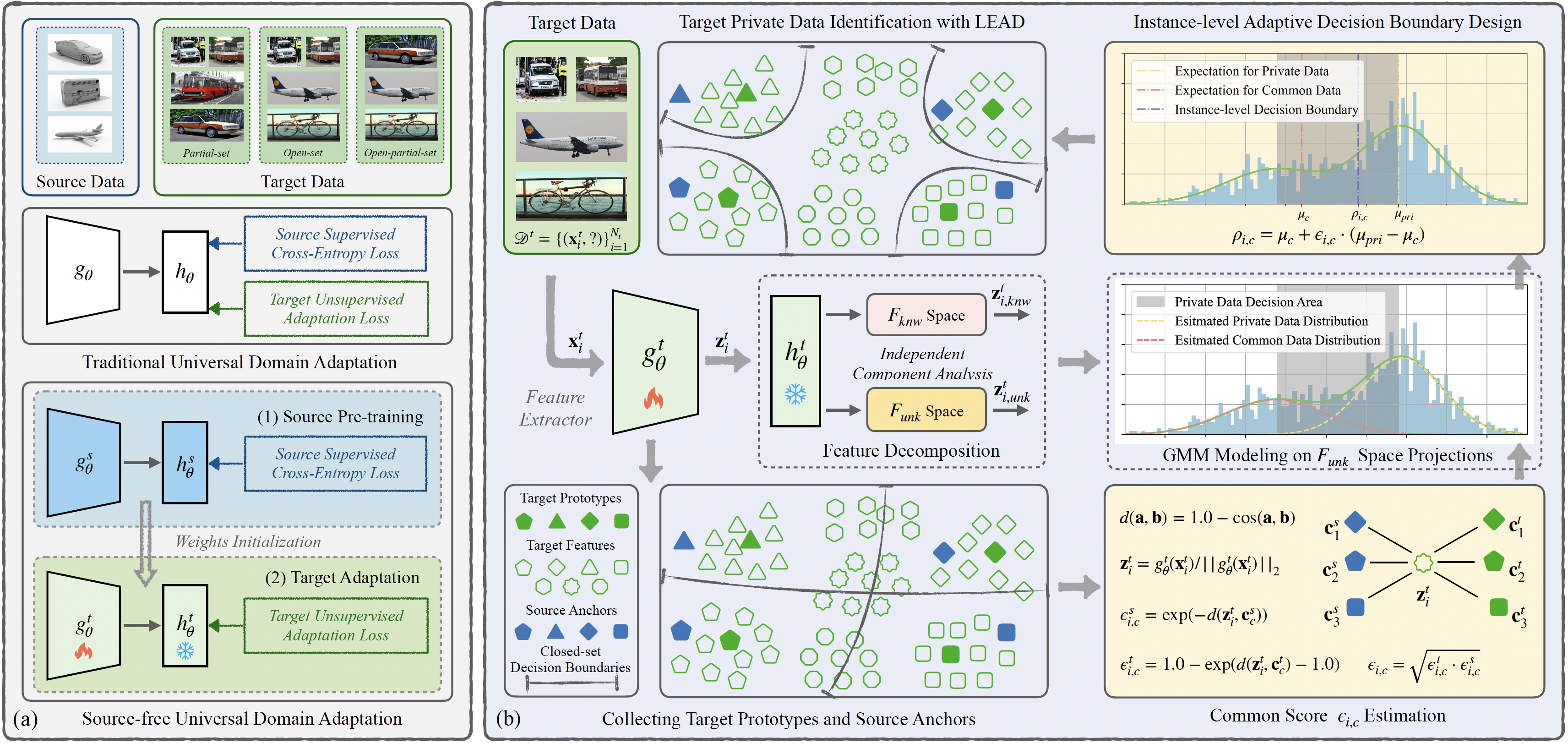The main challenge for Source-free Universal Domain Adaptation (SF-UniDA) is determining whether covariate-shifted samples belong to target-private unknown categories. Existing methods tackle this either through hand-crafted thresholding or by developing time-consuming iterative clustering strategies. In this paper, we propose a new idea of LEArning Decomposition (LEAD), which decouples features into source-known and -unknown components to identify target-private data. Technically, LEAD initially leverages the orthogonal decomposition analysis for feature decomposition. Then, LEAD builds instance-level decision boundaries to adaptively identify target-private data. Extensive experiments across various UniDA scenarios have demonstrated the effectiveness and superiority of LEAD. Notably, in the OPDA scenario on VisDA dataset, LEAD outperforms GLC by 3.5% overall H-score and reduces 75% time to derive pseudo-labeling decision boundaries.
- python3, pytorch, numpy, PIL, scipy, sklearn, tqdm, etc.
- We have presented the our conda environment file in
./environment.yml.
We have conducted extensive expeirments on four datasets with three category shift scenario, i.e., Partial-set DA (PDA), Open-set DA (OSDA), and Open-partial DA (OPDA). The following is the details of class split for each scenario. Here,
| Datasets | Class Split | ||
|---|---|---|---|
| OPDA | OSDA | PDA | |
| Office-31 | 10/10/11 | 10/0/11 | 10/21/0 |
| Office-Home | 10/5/50 | 25/0/40 | 25/40/0 |
| VisDA-C | 6/3/3 | 6/0/6 | 6/6/0 |
| DomainNet | 150/50/145 |
Please manually download these datasets from the official websites, and unzip them to the ./data folder. To ease your implementation, we have provide the image_unida_list.txt for each dataset subdomains.
./data
├── Office
│ ├── Amazon
| ├── ...
│ ├── image_unida_list.txt
│ ├── Dslr
| ├── ...
│ ├── image_unida_list.txt
│ ├── Webcam
| ├── ...
│ ├── image_unida_list.txt
├── OfficeHome
│ ├── ...
├── VisDA
│ ├── ...
- Please prepare the environment first.
- Please download the datasets from the corresponding official websites, and then unzip them to the
./datafolder. - Preparing the source model.
- Performing the target model adaptation.
- Open-partial Domain Adaptation (OPDA) on Office, OfficeHome, and VisDA
# Source Model Preparing
bash ./scripts/train_source_OPDA.sh
# Target Model Adaptation
bash ./scripts/train_target_OPDA.sh
- Open-set Domain Adaptation (OSDA) on Office, OfficeHome, and VisDA
# Source Model Preparing
bash ./scripts/train_source_OSDA.sh
# Target Model Adaptation
bash ./scripts/train_target_OSDA.sh
- Partial-set Domain Adaptation (PDA) on Office, OfficeHome, and VisDA
# Source Model Preparing
bash ./scripts/train_source_PDA.sh
# Target Model Adaptation
bash ./scripts/train_target_PDA.sh
If you find our codebase helpful, please star our project and cite our paper:
@inproceedings{sanqing2024LEAD,
title={LEAD: Learning Decomposition for Source-free Universal Domain Adaptation},
author={Qu, Sanqing and Zou, Tianpei and He, Lianghua and Röhrbein, Florian and Knoll, Alois and Chen, Guang and Jiang, Changjun},
booktitle={CVPR},
year={2024},
}
@inproceedings{sanqing2023GLC,
title={Upcycling Models under Domain and Category Shift},
author={Qu, Sanqing and Zou, Tianpei and Röhrbein, Florian and Lu, Cewu and Chen, Guang and Tao, Dacheng and Jiang, Changjun},
booktitle={CVPR},
year={2023},
}
@inproceedings{sanqing2022BMD,
title={BMD: A general class-balanced multicentric dynamic prototype strategy for source-free domain adaptation},
author={Qu, Sanqing and Chen, Guang and Zhang, Jing and Li, Zhijun and He, Wei and Tao, Dacheng},
booktitle={ECCV},
year={2022}
}
